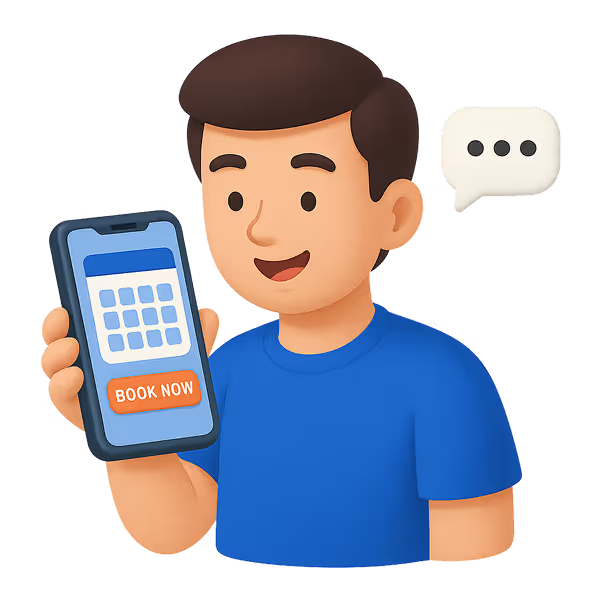
In today's digital world, managing children's screen time can be one of the biggest parenting challenges. While screens are nearly unavoidable, how they are used, especially when parents aren’t around, can make all the difference in a child’s development.
Babysitters often fill the gap when parents are at work, running errands, or simply taking a break. That’s why it’s essential to guide your babysitters in turning screen time into learning time. Find our practical tips and guidelines for parents to tell babysitters to replace screen time with learning and enriching non-digital alternatives.
Why Screen Time for Children Needs to Be Managed
Singapore is taking serious steps to address children’s screen use. The Ministry of Health (MOH) recently introduced some of the world’s strictest screen time guidelines. One notable regulation is the complete ban on background screen time, which occurs when a device is on in the child’s environment, even if they’re not actively watching.
Additionally, the guidelines also recommend:
- No screen time for children under 18 months
- Children aged 18 months to 6 years can only have screen time for educational purposes, with a limit of max one hour per day.
- Children aged 7 to 12 years old can have recreational screen time for only two hours.
While these restrictions may seem tough, they’re based on research linking excessive screen exposure to delays in language, attention, and cognitive development. These recommendations are consistent with those from the American Academy of Pediatrics (AAP).
Why Babysitters Play a Crucial Role
Even the most diligent screen policies can unravel if caregivers don’t follow them. If your children spend lots of their time with a babysitter, it’s important to communicate your expectations related to screen time to the babysitter. This will help the babysitter, who will spend time with your children, know what to do and what the restrictions are related to screen time. Do keep in mind, babysitters may not realize the importance of screen limits unless they are told, thus you can’t expect them to know if you don’t verbally tell them.
How to Communicate Screen Time Rules to Babysitters
Be Direct and Clear
Don’t assume your babysitter knows your preferences related to screen time, they can’t read your mind. Additionally, every household is different—some allow unlimited screen time, others ban it entirely. It’s important to share your rules with your babysitter verbally. Explain to them that implementing this is very important, as you want your child to be able to thrive, and too much screen time can potentially harm that.
To avoid confusion, communicate your rules clearly from the start. This includes how long your children can use screens, what kinds of content are acceptable, and during which parts of the day screen time is allowed or prohibited. Being up-to-date ensures everyone is aligned and can reduce the likelihood of misunderstandings later on.
Specify What’s Allowed and What Isn’t
If your child is allowed to watch certain educational shows, use specific apps, or play approved learning games, you should be clear about which ones are okay and which ones are not. Some babysitters may think that letting a child watch YouTube as long as it's a cartoon is okay. But if that goes against your family’s approach, you need to spell it out.
Provide Alternatives
When screens are restricted or completely off-limits, you should help your babysitter find other options that are as engaging. Babysitters often turn to screens when they are unsure of how else to entertain children. If you provide a list of age-appropriate, screen-free activities, they are more likely to use those instead of falling back on a tablet or TV.
Prepare for Pushback
A babysitter may feel pressured or unsure about how to respond when a child pushes for extra screen time. Prepare your babysitter in advance for these scenarios to help them feel confident in sticking to your rules. Let them know what to expect and reassure them that it’s okay to say no and redirect the child to another activity.
Encourage Engaged Screen Use
If screen time is allowed during the day, it’s best when it's not a passive experience. Encourage your babysitter to be involved by sitting with your child, watching together, and asking questions about what they see or learn.
This kind of engagement can transform screen time into an interactive learning opportunity rather than just background noise or mindless entertainment. It can also build a stronger connection between the babysitter and child, making screen use more purposeful and even become a learning time!
Alternative to Screen Time: Learning Activities for Children
You should equip the babysitter with activities that can support children's physical, social, and cognitive development. Instead of letting the child turn to screen time, use it for learning time instead. Here are a few alternatives to screen time that your babysitter can do to engage the children.
- Arts and Crafts: Let the kids explore their creativity using paper, crayons, scissors, glue, and paint. This is a great activity, and it can help boost children's fine motor skills, creativity, and problem-solving ability.
- Board Games: For older children, you can purchase some classic board games in Singapore, like Scrabble, Monopoly, Connect Four, and Chutes and Ladders—these board games are great for teaching problem-solving in children.
- Outdoor Play: Fresh air and movement are essential. A walk, bike ride, or even a mini scavenger hunt in the yard can keep kids active and entertained. There is a lot of lush greenery in Singapore, so making time for outdoor play in the park will not be hard.
- Pretend Play: Pretend play can help build emotional intelligence and creativity in children. During pretend play, children can explore their imagination and learn how to express their emotions.
- Puzzles and Building Toys: Aside from board games, jigsaw puzzles, Legos, and stacking blocks can also be great game alternatives for children. This game can help improve children's cognitive development, unlike children's games on the phone.
- Science Experiments: This activity is also great for older children who might easily get bored without a gadget or TV. Simple activities like mixing baking soda and vinegar—can wow kids and spark early interest in science. To help your babysitter feel prepared, consider providing them with easy science experiment ideas, relevant books, or helpful website suggestions.
- Helping Around the House: You can also encourage the babysitter to let children help around the house. Simple household chores like cleaning up their toys, sorting laundry, or setting the table can give kids a sense of accomplishment.
The Bottom Line
Turning screen time into more meaningful activities like learning time starts with clear, respectful communication with your babysitters. Babysitters are part of your caregiving team, and with proper preparation, they can help support your child’s healthy development!
Need a babysitter for your child in Singapore? Check out Luce's babysitting service. We provide trusted babysitting services with affordable rates!





















